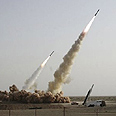
Iranian missile test
Photo: AP
Iran's missile tests last week will strengthen its position in diplomatic efforts to resolve an international standoff over Tehran's disputed nuclear plans, a senior official was quoted as saying on Monday.
Possible cover-up
Discrepancies between photo, video of Iranian missile test indicate possible attempt to cover up technical difficulties during Persian Gulf exercise
"The maneuvers helped the Islamic Republic to go to the negotiating table with a full hand," the official IRNA news agency quoted Deputy Defense Minister Nasrullah Ezatti as saying.
Ezatti, a brigadier-general who is in charge of coordinating armed forces logistics, was speaking five days before Iran's chief nuclear negotiator Saeed Jalili was expected to meet European Union foreign policy chief Javier Solana in Geneva.
In June, Solana presented Tehran with a package of economic and other incentives proposed by world powers to coax it to halt sensitive nuclear work the West fears is aimed making bombs, a charge Iran denies.
'Opposing party succumbed to Iranian desire'
Iran has offered its own package to resolve the dispute.
Tehran has repeatedly refused to suspend its uranium enrichment activities, as demanded by the six world powers before formal negotiations can begin on the offer, which includes help to develop a civilian nuclear program.
Tension increased last week after Iran tested missiles in the Gulf and the United States reminded Tehran that it was ready to defend its allies. Fears of conflict helped to push oil prices to record highs.
Western diplomats say the powers—the United States, Britain, France, Germany, Russia and China—have conditionally offered to hold preliminary talks ahead of formal discussions.
Even for preliminary talks, the big powers say Tehran must freeze any expansion of its nuclear program in return for the UN Security Council halting further sanctions measures.
Iran has given no indication it will accept such a freeze.
"In the nuclear debate, the other party had claimed that Iran should first accept suspension of enrichment so there would be the possibility of negotiation," Ezatti said.
But with the Iran's resistance, "It was ultimately the opposing party which succumbed to the Iranian desire," he said.
Enriched uranium can be used as fuel for power plants but also, if refined much more, as material for nuclear bombs.
The United States, its European allies and Israel accuse Iran of trying to build nuclear bombs under cover of a civilian program. Iran says its program is only for electricity.















